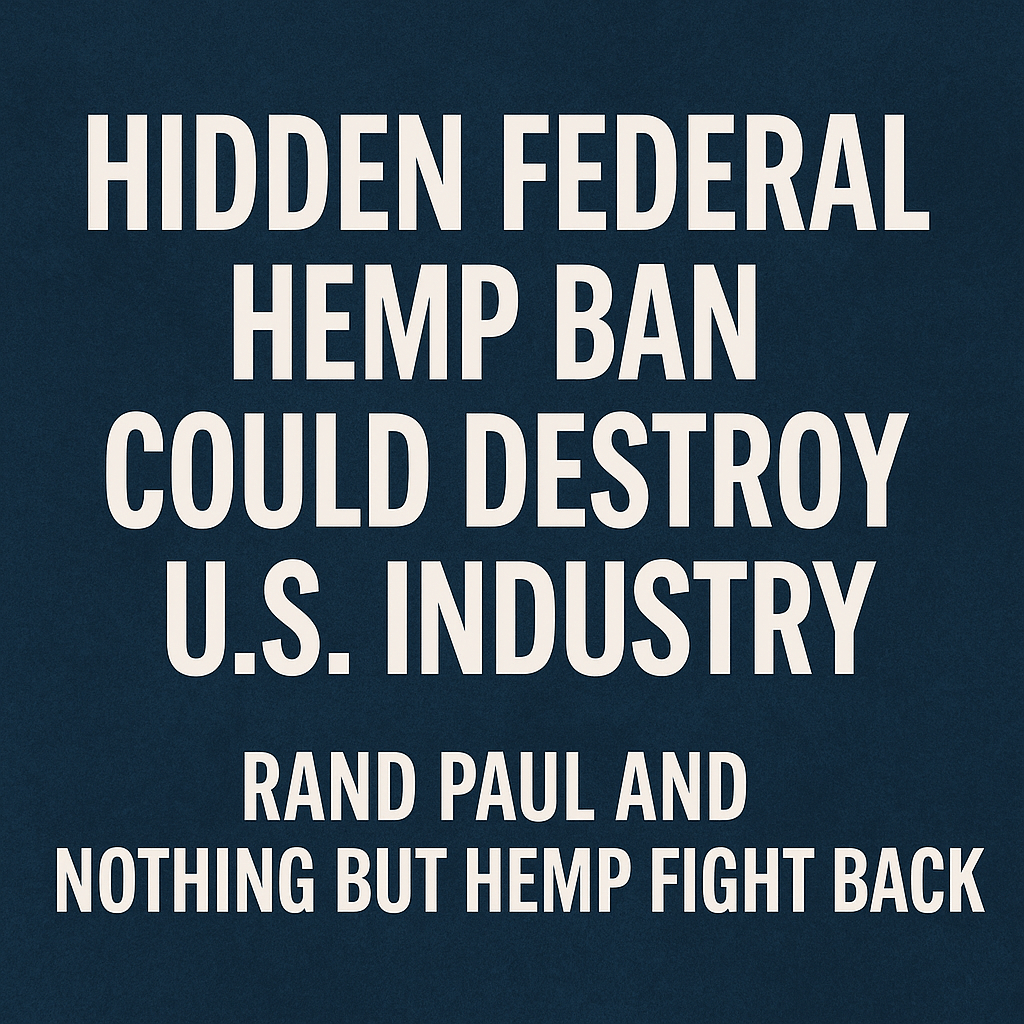Oh, George Allen — President of Lowell Herb Co and part-time philosopher on LinkedIn.
Recently, he declared with great pride that “Legal cannabis is finally organizing against the hemp industry.”
Well George, congratulations — you’ve officially become the hall monitor of the cannabis world. While small business owners are out here fighting for jobs, access, and freedom, you’re busy cheerleading for an MSO-funded campaign called “Future of Hemp” — which, spoiler alert, wants to erase the future of hemp entirely.
George Allen: The Hall Monitor of Cannabis
Let’s be honest: George’s post reads like satire. He’s celebrating that “legal cannabis” (aka the multi-state operator club) is finally organizing — not to fight prohibition, not to push for expungements, not to demand fair taxes — but to attack hemp.
That’s like a solar panel company launching a campaign to outlaw sunlight.
He talks about “ending the legal loophole created by the Farm Bill.”
You mean the same Farm Bill that created 300,000 jobs, fueled thousands of small businesses, and gave people access to safe, affordable cannabis alternatives without having to visit a dispensary that feels like airport security?
If irony were intoxicating, George’s post would be a Schedule I substance.
The Real Villains: The MSO Wolf Pack
George didn’t mention that the campaign he’s applauding — “Future of Hemp” — is organized by Michael Bronstein and the American Trade Association for Cannabis and Hemp (ATACH), a group that’s suddenly allergic to the word hemp.
And guess what? Their list of “Featured Businesses” reads like a who’s-who of corporate hypocrisy.
Here’s who’s backing this anti-hemp campaign:
-
Pharmacann
-
Cresco Labs
-
Verano
-
Boveda
-
GTI (Green Thumb Industries)
-
Centric Brands
-
FTI Corporation
-
Evergreen Cannabis Corporation
-
Scotts Miracle-Gro
-
Drug Plastics
-
Kalo
-
Poseidon Asset Management
-
Keef
-
Ascend Wellness Holdings
-
Vincente Solutions
-
LeafLink
-
Cannabist
-
Safe Harbor Financial
-
Pulp Cannabis Brands
-
Jushi Holdings
-
Canadian Securities Exchange (CSE)
-
Good Day Farms
-
Wyld
-
AYR Wellness
-
Bud & Mary’s
-
TerrAscend
-
Acreage Holdings
-
Columbia Care
-
NRM
These are the brands trying to “save” the cannabis industry by killing the part that made it accessible, diverse, and actually innovative.
And here’s the kicker — many of these companies already make or sell hemp-derived products.
Wyld? Known for hemp gummies.
Keef? Hemp drinks.
GTI? Quietly in the hemp game too.
So, what are they doing? Playing both sides like a bad reality TV villain.
They love hemp money — they just don’t want you to have it.
I’ll Say It Loud: I’m Done With Wyld and the Hypocrites
As of today, I’m done.
I’ll never use, carry, or recommend Wyld, Keef, or any brand that supports this anti-hemp movement.
Why? Because you don’t get to profit off hemp and then lobby to destroy it.
That’s not “future of hemp” — that’s corporate cannibalism.
This campaign isn’t about safety or parity. It’s about power — protecting the old guard and killing off the competition.
If they succeed, they’ll wipe out over 300,000 jobs, close thousands of small businesses, and rob millions of Americans of access to hemp products they actually want.
The People Have Spoken — and They Want Hemp
72% of Americans say they want access to hemp-derived products.
They don’t want to be frisked, scanned, and treated like criminals just to buy a 5mg THC gummy.
They want to grab a drink, a candy, or a gummy — just like they grab a beer — and enjoy it responsibly.
The hemp model is what real legalization looks like.
No velvet ropes. No dispensary gatekeepers. No boardroom monopolies.
Big Cannabis doesn’t hate hemp because it’s dangerous.
They hate it because it’s democratic.
The Farm Bill Didn’t Create a Loophole — It Created Liberty
George and his MSO buddies love to call it a “loophole.”
But what the 2018 Farm Bill really created was opportunity.
It gave Americans a path into the industry without having to pay lobbyists, chase limited licenses, or bow to corporate gatekeepers.
It allowed innovation — like nanoemulsion tech, functional mushroom blends, and hemp-derived drinks that actually fit into everyday life.
If ATACH, Wyld, GTI, Cresco, and the rest of this clown car get their way, that progress ends.
They’ll put cannabis back in the hands of the same handful of corporations that made it inaccessible in the first place.
The “Old Model” is Dead
The dispensary model was never designed for the people. It was designed for control.
High prices, limited access, overregulation — that’s how they keep cannabis “exclusive.”
But hemp flipped the script.
Now anyone can enjoy safe, tested, low-dose THC products without bureaucracy.
And Big Cannabis can’t stand it.
So now, instead of adapting, they’re lobbying Congress to shut down their own industry’s future.
Brilliant strategy — if your goal is to go extinct.
Final Thought: George, Sit Down. The Future Doesn’t Need You
George, my friend, you’re not leading a movement — you’re hosting a funeral.
The “Future of Hemp” campaign is a last-ditch effort by bloated MSOs to stay relevant while the rest of us build the future without them.
So here’s to the real innovators — the hemp farmers, formulators, shop owners, and consumers who actually care about access and freedom.
We don’t need your permission.
We don’t need your trade associations.
And we sure as hell don’t need George Allen lecturing us about “parity” while his friends cash checks from both sides.
The hemp industry is the future — and it belongs to the people.
No frisking required.

⚠️ Disclosure & Disclaimer
This article represents the personal opinions and commentary of the author and is intended for informational and editorial purposes only.
It is based on publicly available statements and affiliations of companies and individuals who support or are associated with the American Trade Association for Cannabis and Hemp (ATACH) and its “Future of Hemp” campaign, as of the time of publication.
All opinions expressed are the author’s alone and do not represent any formal claims, accusations, or verified facts about any individual or organization.
Any references to companies, brands, or persons are made as part of protected opinion and fair comment on matters of public interest within the cannabis and hemp industries.
Readers are encouraged to conduct their own research and draw their own conclusions.







































